Adam Donen - Interview
by John Clarkson
published: 28 / 8 / 2011
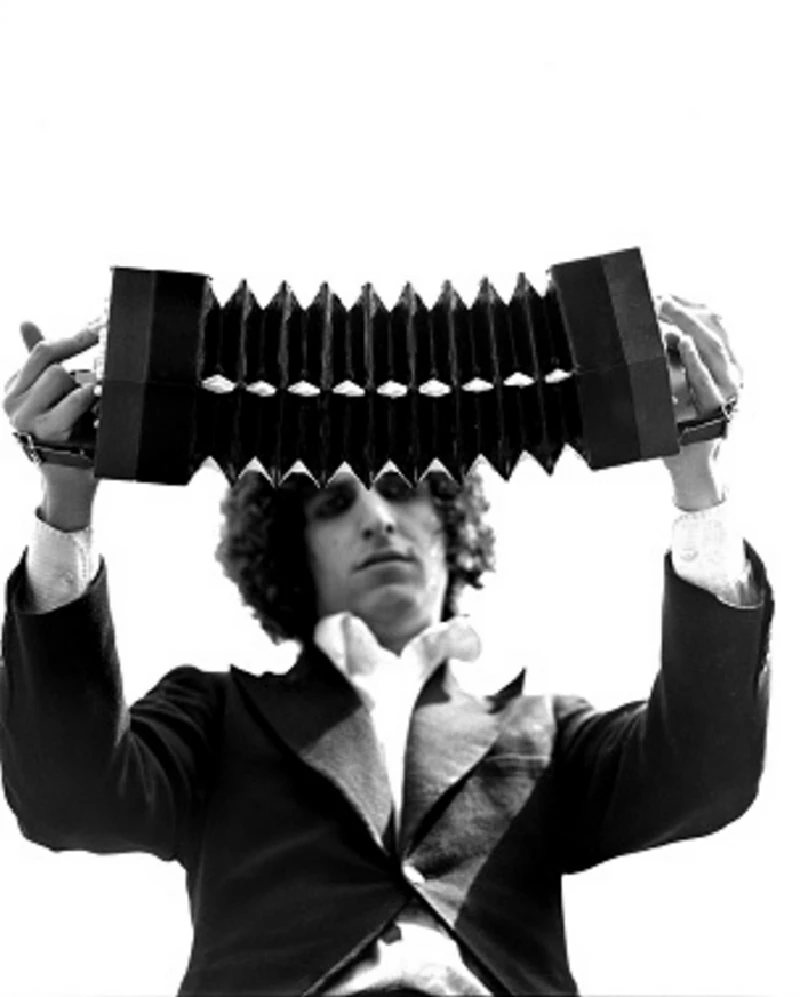
intro
In his second interview with us, South African born and now London-based singer-songwriter and poet Adam Donen speaks about the more worldly vision of his new solo album, 'Vampires', and the influence of David Lynch and Ingmar Bergman as well as literature on his work
“If I met my 22 year old self, and the one who recorded ‘The Daydreams of Youth’, I would be bored with him, and leave him to go off and do smack or whatever else he wanted to do,” says Adam Donen. “I think that there is only a congenital relationship to one’s self of two or three or five years ago. I don’t relate much to that person anymore. At every point I can see perfectly why someone in the position of any of my previous positions felt the way that they did, yet at the same time it is not me now.” In what is his second interview with us, Adam Donen is talking to Pennyblackmusic on the outside deck of the Tamesis Dock, a small London cafe bar boat that is moored permanently on the edge of the Albert Embankment on the River Thames. The hold of the Tamesis Dock, a converted 1930’s Dutch barge, has a 70 capacity occasional venue where Donen once played a gig. As we chat in the late afternoon of what has been an off and on warm July day about Donen’s new album ‘Vampires’, its staff move around beside us, preparing for a private function that evening. There is an element of a Victorian fop to Adam Donen. He is dressed in the same expensive white jacket that he wears on the sleeve of ’Vampires’, and he blows smoke rings from a cigarette that he draws on through a black holder the length of a conjuror’s stick. He matches this with a fierce intellectuality that displays a deep academic knowledge of the heavyweight greats of literature, philosophy and cinema. Donen, who is 26, was born in Cape Town, the eldest child of anti-apartheid activists. He made his first public appearance infamously at the age of six reciting poems by William Blake and Coleridge to ANC freedom fighters inside a maximum security prison. He moved to London at the age of eighteen to study English and to form a band. His first group, the Alexandria Quartet, which took its name from a set of fifties philosophical novels by the writer Lawrence Durrell, had an abrasive, turbulent sound and were heavily political. The Alexandria Quartet were praised universally by the critics, but burnt out in 2007 on a relentless schedule of touring and drug misuse weeks after releasing their only EP, ‘The Daydreams of Youth’, and after just over a year together. When Donen re-emerged in 2008, it was with a backing band called The Drought and an orchestral rock album, ‘As Our Parents Turned to Clay’, that he confined to selling at gigs and which was accompanied by a book of poetry. His next album and first official solo release, ‘Immortality’, which came out last year, maintained the strings and female backing vocals of its predecessor. Stripped of both drums and electric guitar, and, with flute and brass being added for the first time, its orchestrations were, however, on a much more lush and epic scale. ‘Vampires’, which was produced like all his records by Donen, is another progression. It involves much the same instruments as its predecessor, but this time they are a less of mass, each with its own place. While both ‘The Daydreams of Youth’ and ‘As Our Parents Turned to Clay’ were discordant rock records, and ‘Immortality’ had a more lavish sound, each was underscored with a violence. That violence is still omnipresent on the new album on songs such as the score-settling title track and ‘Manor House Girl’, which is in part about a relationship with a fickle former girlfriend. At another level tracks, however, such as ‘And There Will Come a Time’, a seduction ballad, and ‘Sickle Moon’, about both the beauty and savagery of nature, there is, however, a new found sense of tenderness and calm. Interviewing Adam Donen is a complex, sometimes conflicting experience. His thoughts and concerns are those that usually come from someone many, many years older. His lyrics are frequently abstract, a cascading torrent of opulent and on surface appearances seemingly only loosely connected phrases. They are by his own admission self-obsessive, yet on a personal level Donen is both charming and never anything less but giving. His music and arrangements are equally dense and multi-layered but also sweeping with melody. There is nobody else making music quite like him today. PB: How long ago was ‘Vampires’ recorded? It was a long time ago, wasn’t it? AD: It was a long, long time ago. It was back when Jesus was a cowboy. It was recorded in March of 2010. It is terrible that it has taken this long to get it out, although in some ways it is kind of lucky because I have been in a totally different place, and have come back to it and am feeling very close to this album again. PB: ‘Vampires’ is at one level an orchestral album but it is also very minimalist. Every instrument on it seems to stand out on its own and to have its own distinctive voice. Was that intentional with this record? AD: Very much so. On ‘Immortality’, although I had in some senses stripped everything down, in others everything had become a lot more frantic than ever before. I wanted everything on ‘Vampires’ to slow down completely, and everything to exist in a totally defined fashion. The whole of ‘Vampires’ is dominated by putting everything in its right place. PB: There have been a lot of literary and biblical references on your previous records. On ‘Vampires’ you haven’t cut them out entirely, but you have cut them down a lot and it is not until the fourth track, ‘Manor House Girl’, that you get in a real literary reference with the line “As a better man like Don Juan or Romeo would do.” Was that deliberate? AD: It was certainly deliberate that I should be less dependent on references. I was going through this whole thing of attempting to declutter my soul. ‘Immortality’ broadly represented what was going on in my small room in London and effectively I went into my books for most of it. ‘Vampires’ was, however, written in part in Cape Town staring out in isolation at the sea and the sickle moon. A couple of its other tracks were written outside London in the East of England where the sky is grey and the sea is grey but it was a very similar landscape to that which I saw in Cape Town. Both of those experiences completely transformed me, and it was the first time in a long time that I felt like I had a new canvas in front of me. I hadn’t been to Cape Town in four years before that and since I had left university. It was very good for me to go back. I am going back there now a lot more often these days. You’re actually wrong though about the literary and biblical references. On ‘And There Will Come a Time’ and the line “The very oceans will turn to gold/The old bitterness turn to ash” I was thinking about the Book of Luke. It is definitely a lot less obvious though. PB: A lot of your songs on this and your other albums show a strong interest in religion. Where has that interest come from? Did you have a religious upbringing? AD: One of the dominant themes in my writing it is that I am desperately bothered about God. I desperately want there to be a God, and I am desperately unable to convince myself that one exists. I went to an Anglican school and when I was twelve I told my father that I didn’t believe in God, and he went, “Good.” He was glad. He didn’t either but he wanted me to figure it out for myself about which I was initially very bitter. I grew out of my militant atheist stage by the time I was nineteen, and then I went through a wonderful hedonistic stage when I first came to London, which extended through studying Literature into the Alexandria Quartet days. After that I became very, very desperate for love to be something more significant in my life than that.I tried desperately as a result to find something and I am still trying. I was reading Christopher Hitchens’ God is Not Great’ recently, and the difference between Hitchens and I, other than he is a brilliant prose writer, is that he doesn’t believe in God and he doesn’t want there to be a God because, and to quote him, “he doesn’t want to be a slave,” whereas I can’t believe in one but desperately want there to be one. PB: What were the other main influences of this album? AD: A lot of it was influenced by a photographer and filmmaker, Magnus Arrevad, who was involved in the making of a video for ‘Sophia’, the first track on the album. He is trying to do something in photography which I tend to do with my music which is to create a world of association where one can feel things, although one can’t always express those feelings because words themselves are limited. They are always, however, trying to reach closer and closer to what we sense but are unable to express. The film directors David Lynch and Ingmar Bergman were the two other main influences. I am thinking in the case of Lynch of ‘Eraserhead’, ‘Twin Peaks: Fire Walk With Me’, ‘Mulholland Drive’ and ‘Inland Empire’ in particular. All of those films have a strange dream logic. On a narrative basis there is no reason why one event should follow the next, although both in a linear cause and effect basis and emotionally they make perfect sense. Lynch's approach to narrative is the biggest thing I've learned from him. But there are others. Firstly he doesn't do characters. Consequently there is, in one respect a coldness: one can't relate directly to anyone. But as a reward, one's left with pure senses. ‘Vampires’ was at least partially an attempt to make songs that sounded like his films look to me. Oversaturated, strangely distant, scratchy. I made a decision to record the album on 24-track analogue tape and it stemmed largely from this - particularly on ‘Sophia’ and ‘Sickle Moon’. I'm very happy with the results. And then there is the mood - the unheimlich (uncanny) - that permeates his work which I sought to conjure up in certain of the tracks, and particularly ‘Come Back to Me’, The Circle Game, Again’ and’ Sickle Moon’. A sense of disquiet, where something terrible and inexpressible is just round the corner. PB What about Ingmar Bergman? What was the appeal to you of him? AD: I think with him more than anything else it is the authority with which he presents his stories. There is nothing superfluous with him whatsoever. I think that in some ways that the way you described as my instrumentation on this record was my attempt to be Bergman. In his 1966 film ‘Persona’, for example, there is an early scene in which you see a nurse, and she is talking for three or four minutes and you don’t see anything else. You are aware that she is sitting at a table. There is a blank wall behind her. It is perfectly plausible for the scene. It is not being self-conscious or anything else. It is just that he doesn’t move the camera, and she is talking for four minutes. PB: Your lyrics are always autobiographical. In the book that accompanies ‘My Parents Turned to Clay’, your friend and Drought band mate Tom Dewey describes how when the Alexandria Quartet was coming to an end you had a breakdown and became agoraphobic for a while. You have never focused on that in your lyrics. While your lyrics are always personal, you have concentrated on universal themes such as religion and love and romance instead. Why have you kept off that particular topic? Is it just too private? AD: No, to be honest, I don’t regard it as any more private than anything else. I haven’t written a Great Aagoraphobia Song it is true. I think, however, that most of the time I don’t speak very specifically about any subject. Other than one song on ‘Immortality’, which in some ways I regret and in others I quite like, I have never to my knowledge realised a song that has just said that this song is about this particular person and this particular day and this particular time. There is usually something more to it than that. I certainly think though that the subject of agoraphobia has cropped up in the construction of a lot of the stuff that I tend to play. In ‘Immortality’ and ‘Century of Stone’ from the last album in particular, there is a claustrophobia that is totally heartfelt . Both ‘As Our Parents Turned to Clay’ and ‘Immortality’ are very much records of someone stuck in a room imagining things. I have got this idea of the world outside rather than experiencing it, whereas this album is very much about engaging with the world rather than imagining it. PB: There are still moments of great violence on ‘Vampires’ but this album seems to be in many ways a much calmer affair. Would you agree and was that your intention? AD: I would agree, but it wasn't at all my intention. My intention, if ever one has an intention in these things, was to achieve peace - or perhaps more accurate, order - by the end of the album. Both in the work, and, by extension, on a personal basis. Brett Easton Ellis puts it nicely at the beginning of ‘Lunar Park’: “I wanted a return to that past simplicity. I was overwhelmed by life, and those first sentences seemed reflections of what had gone wrong. It was time to get back to basics, and though I hoped that one lean sentence... would start the process, I also realised it was going to take more than a string of words to clear away the clutter and damage that had amassed around me. But it would be the beginning.” That said, I imagined the album - the journey to that orderliness - as being a very violent one. And in some ways it is. There are more murders on it than in any of my previous works. There are two in ‘Come Back to Me’. Kids dance in their parents’ flesh at one point in ‘The Circle Game’, and there are at least two specific murders in the second half of ‘Vampires’, the title song, plus one massacre of supporting characters (“The men have died, and worms have eaten them... see the black figures of your arm shatter.”) And that's before we consider the castrations that also take place, and what on earth might have happened to dear Sophia. But in any event, late one night, I found myself playing the tracks to an old friend, who's known me since the Alexandria Quartet days, and they were shocked... they called it “placid”! And, with hindsight, I take the point. I think though, that, more than calm, what's left the work is the melodrama, and the rigidly personal. It's become, in some sense, colder, which picks up on my previous point about David Lynch. PB: ‘And There Will Come a Time’ seems to suggest that all our dramas and crises are ultimately only of importance to ourselves and always of the moment. Is that what you were trying to say with that song? AD: That is what I kept telling myself. There is a tension all the way throughout ‘And There Will Come a Time’ which is a song that I am very, very fond of, and the tension stems from being in the middle of it something, and at the same as declaring that none of it matters at all. The third stanza is very much about trying to get a girl into bed. PB: You said the last time that we spoke that you decided that when you were six you wanted to be a poet, a musician or a vampire. You have become both a published poet and a musician and named the album after the latter. Why have you decided to call it ‘Vampires’? AD: My six year old self would be very, very proud of me (Laughs). As I said, I don’t have much in common with my previous selves but I have a lot of time for them. More to the point, I think that probably the biggest drama in this record is between what we want to be and the worlds that we want but at the same time which are very, very bad. This album is in some respects an exploration of the just under half of myself which is a very, very horrible creature, and at the same time a far more exciting one than the other half that sits back and behaves and has a decent touch. This record is a very slow and systematic attempt to literally nail down and put everything in its place, and kill everything that needs to be killed. The final title track in particular is essentially a very violent murder ballad and a deeply satisfying one. PB: What in particular were you trying to kill? AD: What was I trying to kill? Franticness. And haziness. I wanted to create order. We spoke in the previous interview about the fight between Apollo and Dionysus (about which Nietzsche wrote so often and well). Come to think of it, if we did, I was probably trying to create order before. It's something I often attempt. This time, though, it was a serious project. I am now 26. I realised a while ago, probably even before recording ‘Vampires’, that I hadn't created enough of note to justify a place in the 27 Society, so, short of an accident, it was my punishment to stick it out for the long haul. And if there were going to be decades more to be faced, I wanted to be able to look squarely and fearlessly in the eyes of all their horrors and joys, rather than burning, then cowering, constantly flickering, like Plath, Kafka and so many of the other idols of my earlier selves. PB: Since we last spoke to you, you have now got a band. Who are they? AD : They are Paul Love on drums, musical saw and harmonica; Ayaka Tanimoto on soprano vocals and glockenspiel; Chris Winfield-Chislett on piano, Rhodes and accordion, and Yuki Tashiro on violin. PB: ‘Vampires’, as you said, was recorded eighteen months ago. Have you begun work on the next album yet? AD: Sadly I have always hated this and I thought that I was alone in hating this, but I have discovered more recently that I am not alone in having to record eighteen months in advance. I have finished recording the next album. It is a lot longer than ‘Vampires’ or ‘Immortality’. It is almost the length of the two of them combined. It was recorded in Cape Town earlier this year with Yuki and Ayaka. PB: Do you have a title for this album and what does it sound like in comparison to your other records? AD: There is no title as yet, although Robert Harder,my regular engineer,has proposed ‘False Bay’. It contains some of my most dissonant and challenging work yet, and, on at least a couple of tracks, the closest I've come (and perhaps will ever come) to writing pop songs. In some respects, it's freer than the last two records. It also contains a 26-voice choir singing ‘America! America!’ PB: You are going to be touring across Europe and the UK between September and November. Are they going to be band dates or solo dates? AD: It is going to be primarily solo dates. My band to their eternal credit have many other things on the go, many of them classical projects that don’t allow them to be around all the time and I desperately don’t want to drag them from it as they are doing such wonderful things. In October, however, I am going to be touring Germany, Belgium, Italy, the Netherlands and France, and the band are coming along for most of that and then hopefully they will be playing some of the bigger November dates in England and Scotland. My launch gig for ‘Vampires’ will take place with a twenty piece band at King’s Place in London on October 7th, the day the album comes out in the UK. That gig will be the way which I have always wanted my music to sound, and will be far closer [to what they sound like] on record than anything that I have done before. It is all the instruments that I have ever wanted. There will be strings, brass, a choir of six which would usually be done by my trio of backing vocalists and an electric organ which makes a big difference and which I haven’t had live for a long time. The album is released across Europe on the 28th October. My European launch will be in Bremen where my label is based. I have been promised that if my London launch goes well with the twenty piece that on my next disc that I will be allowed to launch with the Bremen Philharmonic. PB: Are you working on anything else at the moment? AD: Aside from all these other things, I am now also working on a film which we are looking at beginning shooting next April. Mikael Jaeger Jensen, who also worked on the 'Sophia' video, is doing a film of Edgar Allan Poe’s ‘The Raven’, and to his eternal credit and eternal idiocy has asked me to play the lead role in it, so I am rehearsing frantically for that at the moment. PB: Have you acted before? AD: I acted horrifically in the ‘Sophia’ video and I don’t know what he saw in it. He seems to think that I have it in me to play the role of the poet pining for his lost love, which will be interesting. PB: Will it be independently released? AD: This is a short film. It will be about fifteen or twenty minutes long, and the cast is going to be me, a raven and an animal trainer (Laughs). We are shooting in September, and I am not sure when the release will be. PB: Thank you.
Picture Gallery:-
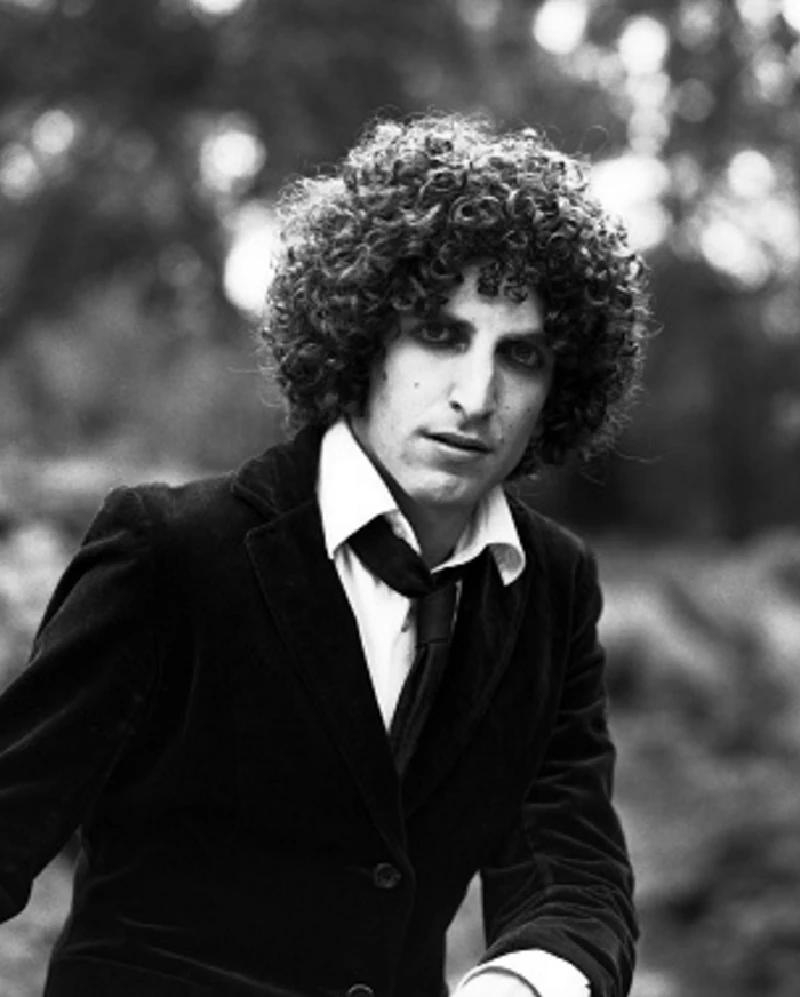
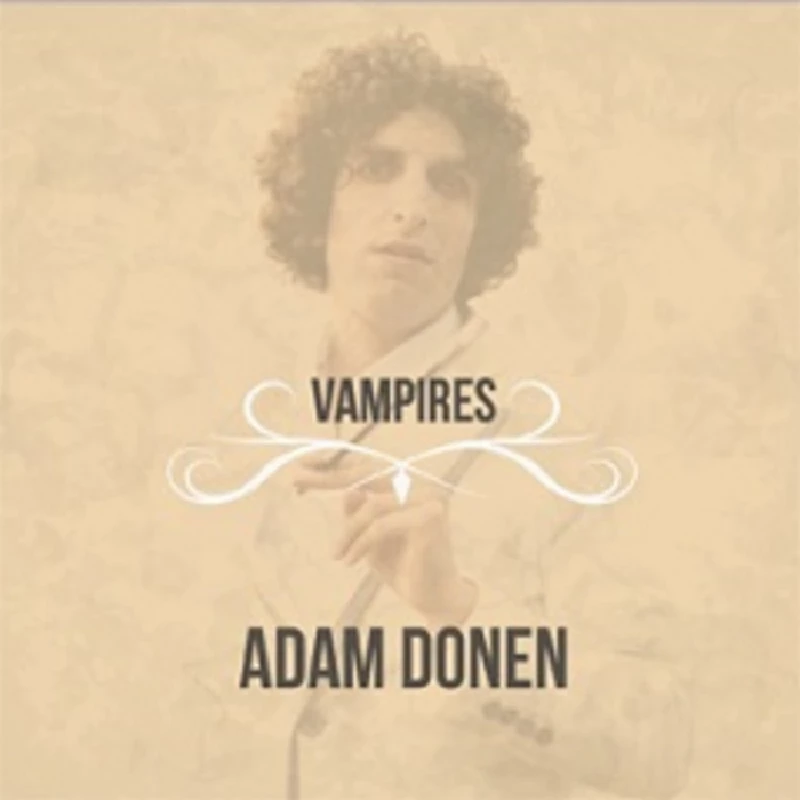
interviews |
|
Interview (2010) |
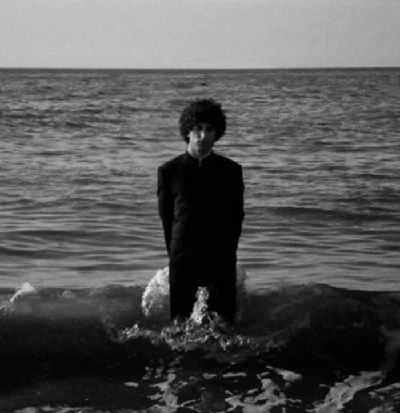
|
| South African-born and now London-based poet and singer-songwriter Adam Donen speaks to John Clarkson about his recently released debut album proper, the orchestral 'Immortality', which was inspired by a romantic break-up and is also a tribute to the last decade |
live reviews |
|
Shoreditch Church, London, 4/4/2014 |
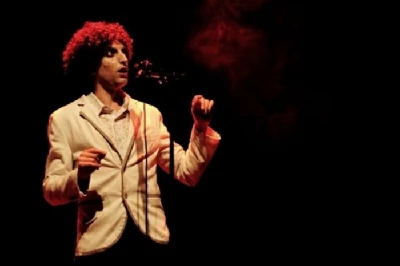
|
| Dominic Simpson watches experimental musician Adam Donen, who is now based largely in Berlin and becoming increasingly known as a classical music composer, play a rare rock show to promote his third solo album 'False Bay Echoes' at Shoreditch Church in London |
most viewed articles
current edition
Carl Ewens - David Bowie 1964 to 1982 On Track: Every Album, Every SongBathers - Photoscapes 1
Armory Show - Interview with Richard Jobson
Colin Blunstone - Thalia Hall, Chicago, 16/7/2025
John McKay - Interview
Visor Fest - Valencia, Spain, 26/9/2025...27/9/2025
Billie Eilish - O2 Arena, London, 10/7/2025
Bathers - Photoscapes 2
Editorial - July 2025
Sir Tim Rice - Interview
previous editions
Heavenly - P.U.N.K. Girl EPOasis - Oasis, Earl's Court, London, 1995
Trudie Myerscough-Harris - Interview
Pixies - Ten Songs That Made Me Love...
Simon Heavisides - Destiny Stopped Screaming: The Life and Times of Adrian Borland
Beautiful South - Ten Songs That Made Me Love...
Prolapse - Interview
Blues and Gospel Train - Manchester, 7th May 1964
Boomtown Rats - Ten Songs That Made Me Love....
Fall - Hex Enduction Hour
most viewed reviews
current edition
Amy Macdonald - Is This What You've Been Waiting For?Sick Man of Europe - The Sick Man of Europe
Alice Cooper - The Revenge of Alice Cooper
Phew, Erika Kobayashi,, Dieter Moebius - Radium Girls
Lucy Spraggan - Other Sides of the Moon
Blueboy - 2
Cynthia Erivo - I Forgive You
Davey Woodward - Mumbo in the Jumbo
Lapsley - I'm a Hurricane, I'm a Woman In Love
Philip Jeays - Victoria
Pennyblackmusic Regular Contributors
Adrian Janes
Amanda J. Window
Andrew Twambley
Anthony Dhanendran
Benjamin Howarth
Cila Warncke
Daniel Cressey
Darren Aston
Dastardly
Dave Goodwin
Denzil Watson
Dominic B. Simpson
Eoghan Lyng
Fiona Hutchings
Harry Sherriff
Helen Tipping
Jamie Rowland
John Clarkson
Julie Cruickshank
Kimberly Bright
Lisa Torem
Maarten Schiethart